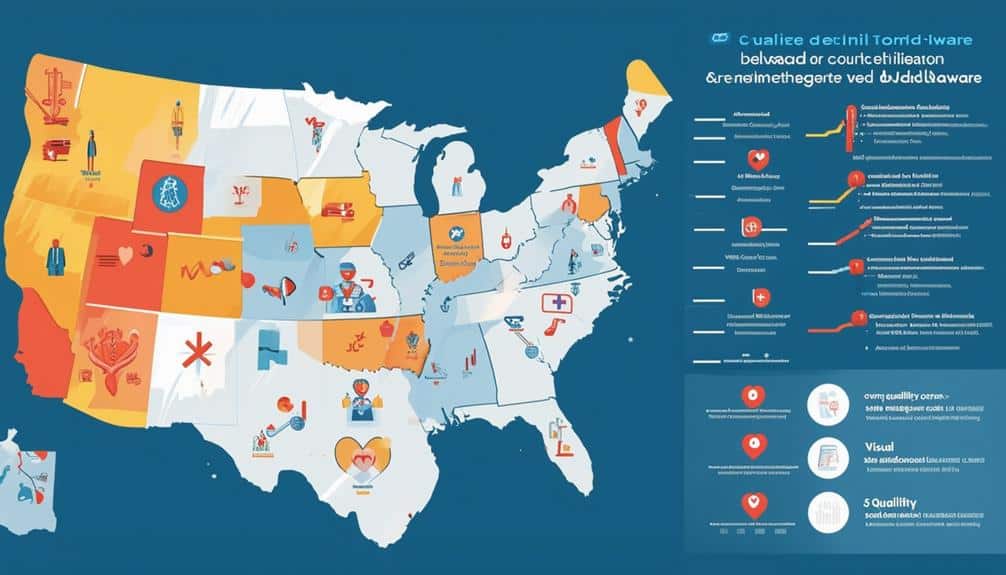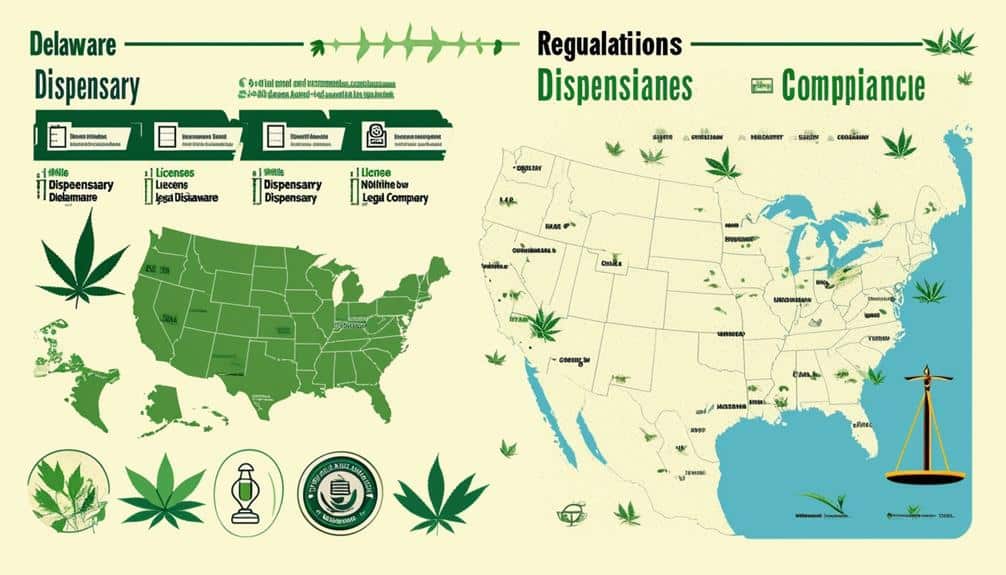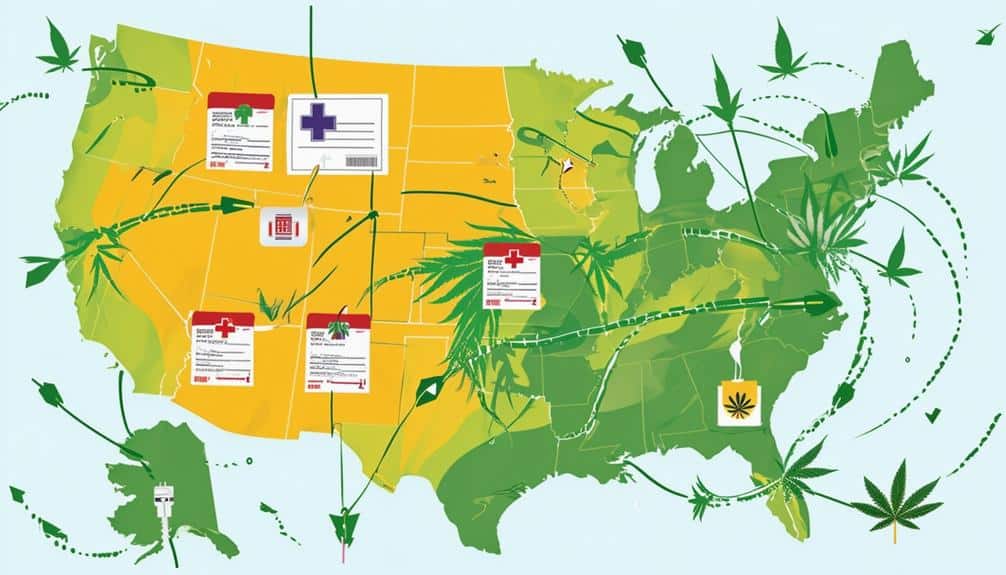Delaware’s medical cannabis legislation prioritizes chronic and severe illnesses as qualifying conditions, with reasonable possession limits of up to six ounces. The state has implemented stringent rules for dispensaries to ensure safe distribution and mandates comprehensive patient registration. Caregiver provisions aid patients, and legal safeguards are in place for registered individuals. But how does Delaware’s approach truly compare to other states that may provide broader lists of qualifying conditions or greater possession limits? Let’s explore how Delaware balances accessibility and regulatory oversight in a way that might surprise you.
Table of Contents
Qualifying Conditions

In Delaware, the list of qualifying conditions for medical marijuana is more restrictive compared to many other states, emphasizing chronic and debilitating diseases. Conditions such as cancer, HIV/AIDS, multiple sclerosis, and severe pain are among those that qualify.
To gain access, you must first secure doctor approval through a thorough evaluation confirming your condition meets the state’s stringent criteria.
Once you have your doctor’s endorsement, the application process begins. This involves submitting a detailed application to the Delaware Department of Health and Social Services (DHSS), including your medical records and the physician’s certification. The process requires precision and patience as any errors can delay your approval.
Public awareness and patient education are vital components of Delaware’s medical marijuana program. Understanding the qualifying conditions can help you advocate for yourself or others in need. The state provides educational resources to ensure patients are well-informed about the benefits and limitations of medical marijuana.
Awareness campaigns aim to educate the public on how to navigate the system, highlighting the importance of doctor approval and the application process. By staying informed, you can better serve those seeking relief through medical marijuana in Delaware.
Possession Limits
Once you’ve navigated the application process and obtained your medical marijuana card, understanding Delaware’s possession limits is crucial for compliance with state regulations.
In Delaware, registered patients can possess up to six ounces of usable marijuana at any given time. It’s important to note that public consumption is strictly prohibited and can result in enforcement actions, including fines or revocation of your medical marijuana card.
For those serving minors, it’s important to understand specific school policies. Medical marijuana cannot be administered on school grounds, school buses, or at any school-related functions. This policy ensures that schools remain compliant with federal laws while balancing the needs of minors who require medical marijuana for treatment.
When comparing Delaware to other states, you’ll find that possession limits are relatively moderate. Some states allow higher limits while others are more restrictive. Delaware’s approach aims to balance accessibility for patients with the need for regulation and control.
Always carry your medical marijuana card to avoid complications during any enforcement checks. By staying informed and adhering to these possession limits, you contribute to a responsible and compliant medical marijuana community.
Dispensary Regulations

Delaware’s dispensary regulations are designed to ensure that medical marijuana is distributed safely and responsibly, with stringent guidelines governing everything from licensing to security measures. To open a dispensary, you must secure a license through a rigorous application process designed to ensure only qualified operators run these facilities. This process includes background checks, financial disclosures, and detailed operational plans.
Security measures are a focal point in Delaware’s regulations. Dispensaries are required to implement robust security protocols, including surveillance systems, alarm systems, and secure storage areas. These measures aim to prevent theft and assure that medical marijuana is only accessible to authorized personnel and registered patients.
Pricing regulations are also in place to prevent price gouging and ensure that patients can afford their medication. The state monitors pricing closely, requiring dispensaries to justify their pricing structures and making adjustments when necessary for fairness.
Patient Registration
Understanding the patient registration process is equally important for accessing medical marijuana in Delaware as well as ensuring safe dispensary operations.
As a patient, you must start by obtaining a written certification from a licensed physician confirming your qualifying medical condition. This certification is an essential piece of documentation needed to proceed.
Once you have the physician’s certification, you’ll need to complete the state’s medical marijuana application form found on the Delaware Division of Public Health’s website. Along with the form, you must submit proof of Delaware residency, a copy of government-issued ID, and the physician’s certification. A registration fee must also be paid during this process.
Privacy concerns are taken seriously in Delaware’s medical marijuana program. The state ensures that all patient information is kept confidential protecting your patient rights. The database used for registration is secure with access limited only to authorized personnel minimizing risk of unauthorized data breaches.
Caregiver Provisions

If you’re unable to obtain or administer medical marijuana on your own, Delaware’s medical marijuana law allows you to designate a caregiver to assist you. This provision ensures that patients have the necessary support to manage their treatment effectively.
Caregiver qualifications are strict to ensure patient safety. A designated caregiver must be at least 21 years old, undergo a background check, and have no felony convictions. They must also be a Delaware resident ensuring they’re readily available to assist you. Each caregiver can serve up to five patients allowing them to provide focused and personalized care.
As a patient, you have specific responsibilities when designating a caregiver. It’s important that the caregiver understands their role and the legal obligations associated with it. You must also provide accurate and up-to-date information about your medical condition and treatment needs helping the caregiver provide the best possible support.
In comparison to other states, Delaware’s caregiver provisions are relatively strict emphasizing patient safety and caregiver accountability. These regulations ensure caregivers are well-qualified and patients receive reliable assistance enhancing overall effectiveness of the medical marijuana program.
Home Cultivation
While caregiver provisions ensure necessary support is available, home cultivation offers another route for obtaining medical marijuana in Delaware.
However unlike some states that allow patients to grow their own cannabis, Delaware currently prohibits home cultivation for medical marijuana users. This restriction can have significant legal implications as violating this law may result in fines or other penalties.
From an analytical perspective, the prohibition on home cultivation affects personal freedoms and requires patients to rely solely on dispensaries. For some, this means limited access to specific strains or higher costs. The absence of home cultivation rights could limit your ability to manage your treatment autonomously impacting your personal freedoms.
On the community impact front, allowing home cultivation could potentially reduce strain on local dispensaries and provide patients with more immediate access to their medication. However it also necessitates careful government oversight to ensure safe and responsible growing practices.
Balancing needs for personal freedom with community safety and regulation is a complex issue.
Reciprocity Agreements

Reciprocity agreements enable medical marijuana patients from one state to legally obtain and use their medication in another state with similar laws. If you’re a patient who needs to travel these agreements can greatly ease your concerns about access to your medication.
Importantly Delaware recognizes medical marijuana cards issued by other states allowing you to purchase cannabis from its dispensaries during your stay.
However the landscape of reciprocity agreements varies widely across the United States. While some states have robust systems that allow seamless interstate travel for medical marijuana patients others have restrictive policies or no reciprocity at all.
For instance states like Nevada and Arizona offer full reciprocity permitting out-of-state patients to buy from local dispensaries. By contrast states such as Idaho don’t recognize out-of-state medical marijuana cards at all.
When traveling it’s essential to know the specific regulations of the states you’ll be visiting. Delaware’s approach stands out for its patient-friendly stance on dispensary access yet it’s always wise to double-check local laws before you go.
Understanding these agreements ensures you can continue your treatment uninterrupted reflecting a dedication to patient care and well-being.
Legal Protections
Delaware’s medical marijuana law includes specific legal protections to ensure that registered patients and caregivers aren’t subject to criminal or civil penalties for their medical use of cannabis. These protections are comprehensive and aim to ensure individuals who rely on medical marijuana for their health conditions are treated fairly under the law.
One of the key areas where Delaware’s law stands out is in criminal protections. If you’re a registered patient or caregiver, you won’t face arrest, prosecution, or any penalty for possessing an amount of medical marijuana within the legal limits. This provision creates a safer environment for those who genuinely need cannabis for medical reasons.
Employment rights are another significant aspect. Delaware law offers some level of protection for employees who are registered medical marijuana patients. While employers can’t discriminate against you solely because you’re a registered patient, the law does allow some exceptions. For instance if your job involves safety-sensitive roles or if your usage impairs your ability to perform your duties, the employer has the right to take appropriate action.
Conclusion
In conclusion how does Delaware’s medical marijuana law measure up against others? It strikes a careful balance between accessibility and regulation ensuring chronic and debilitating conditions are prioritized. With moderate possession limits strict dispensary oversight and detailed patient registration Delaware ensures safe and responsible use.
Caregiver provisions and legal protections further support patients though home cultivation and reciprocity agreements are limited. Delaware’s approach may not be the most expansive but it’s certainly robust and well-regulated.
If you’re curious to learn more about how Delaware’s medical marijuana program can benefit you, I invite you to visit Cannabis Docs of Delaware. Our friendly team is here to help and we’d love to answer any questions you might have. Feel free to give us a call at (855) 420-6797. We’re looking forward to hearing from you!

